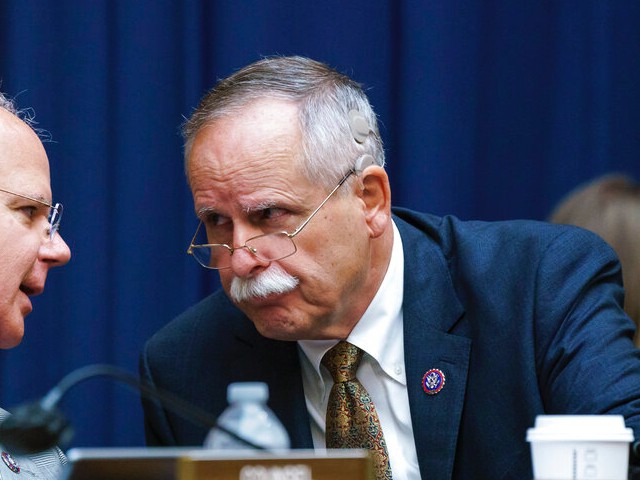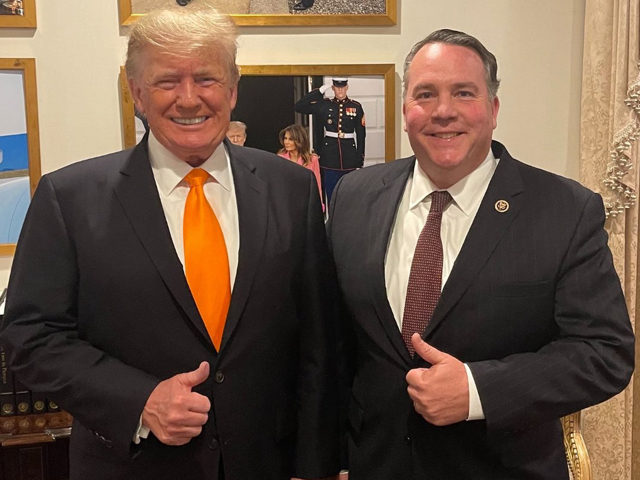West Virginia’s Second Congressional District GOP primary on May 10 between the two incumbents, forced to run against each other due to redistricting, will test the Republican roots and support for former President Donald Trump ahead of the November election.
The West Virginia primary next week, on May 10, will test the base of the party in West Virginia, a state that overwhelmingly voted for Trump in 2020 with 68 percent of the vote. After the 2020 census, the state went through a once-in-a-decade redistricting effort which moved the state from having three congressional districts to only having two.
The new congressional map divided, which was signed into law on October 22 by the Republican governor, divides the state into northern and southern districts, both heavily favoring Republicans.
But, due to the states initially having three congressional seats and none of the members retiring, it forces two Republican incumbents — Rep. David McKinley from the First Congressional District and Rep. Alex Mooney from the Second Congressional District — to run against each other in the primary in the new Second Congressional District.
Thus, setting the stage for the rough primary battle between a “RINO” Republican, McKinley, who has sided with the Democrat, and a Trump-backed Mooney.
The district they are running in overwhelmingly tilts Republican by 34 percent. But the way the new congressional map was divided, the new Second Congressional District has 66 percent of the district McKinley currently represents.
McKinley, who’s been in office since 2011, voted for the Democrat’s partisan infrastructure bill, which nearly every other Republican voted against, including Mooney — becoming a significant point in the primary race.

House Energy and Commerce members Rep. Brett Guthrie (R-KY), left, and Rep. David McKinley (R-WV), right, talk at the Capitol in Washington, Wednesday, September 15, 2021. (AP Photo/J. Scott Applewhite)
In fact, while prominent economists, such as Olivier Blanchard and Larry Summers, have called out the Democrats’ massive spending bill — which McKinley helped pass — as part of the reason for having skyrocketing inflation, which has hit a 40-year high, McKinley said it was “good.”
The lawmaker told Roll Call that the Democrat’s partisan infrastructure bill “is good for West Virginia” and that it “is not a vote for anyone but West Virginia.” The lawmaker also expected that the law would give more than $700 million to his state to help with the abandoned mine lands, improve water quality and allow for economic development.
As McKinley, who was once a civil engineer and campaigned on infrastructure when he was first elected to Congress, touted voting for the bill in his town halls and claimed local officials were begging him to vote for the bill, Mooney paints a different picture.
Mooney said that McKinley “betrayed” the Mountain State by voting for the “January 6, anti-Trump witch hunt to attack our president [Trump] and our values” and the infrastructure law in an ad early this year.
On the same day, President Joe Biden signed the infrastructure bill into law, November 15, Trump endorsed the Mooney saying that he “opposed the horrendous Biden Administration’s ‘Non-Infrastructure’ plan, and he opposed the January 6th Committee, also known as the Unselect Committee of partisan hacks and degenerates.”
I am honored to receive President Trump’s endorsement. I am a proud America First conservative and will do whatever I can to carry on the President’s legacy of fighting for election integrity, defeating socialism, and supporting the Second Amendment in Congress. pic.twitter.com/ioavIFS3kL
— Alex Mooney (@MooneyforWV) November 15, 2021
Then, last month, Trump reiterated his support for Mooney by calling him a “conservative warrior” who is running against a “RINO” who supported the “Unfrastucture Bill” and the “Sham January 6 Unselect Committee.” Trump called on West Virginians to vote for Mooney on May 10, the primary election date.
Roll Call pointed out that McKinley did not vote for the January 6 Committee, which is controlled by House Speaker Nancy Pelosi (D-CA). However, he did vote for a 9/11-style commission to investigate the Capitol attack.
According to a voter analysis by the publication, McKinley supported more of the Trump administration’s policies than Mooney, but only slightly. McKinley aligned himself with the former president on his positions 91.1 percent of the time, while Mooney supported Trump’s positions 86.4 percent. Notably, it was a difference of eight votes.
Mooney also appears to be a stronger fundraiser than his opponent. He spent $5.1 million through April 20 with $874,000 cash left, while McKinley spent $1.9 million and only was left with $510,000. Roll Call also acknowledged that while both campaigns are spending money on negative ads, there have been millions spent on the race from outside groups.
Outside groups have also spent more than $1.9 million on the race, according to a Roll Call analysis of disclosures with the Federal Election Commission (FEC). The disclosures showed that roughly $1.3 million was to help Mooney, which dwarfed the $519,000 spent attacking him and the $83,000 used to support McKinley.
McKinley also looked toward Democrat Sen. Joe Manchin (WV) to help him out on the campaign trail. Manchin backed him in a late to the race ad. The senator claimed that the attacks by Mooney and “his out of state supporters” were an “outright lie” and that his opponent is “all about Alex Mooney, but West Virginians know David McKinley is all about us.”
Mooney’s campaign hit McKinley on the ad, saying Manchin’s ad was “proof David McKinley is a complete and total RINO.”
A recent internal poll released from the Mooney campaign showed that he was in the lead with half the vote in the Republican primary. A poll conducted by Public Opinion Strategies for the Mooney campaign showed that Mooney would receive 50 percent of the vote, which is 20 points up from McKinley’s 30 percent. The poll was taken from April 26 to 28 with 400 likely voters.
Jacob Bliss is a reporter for Breitbart News. Write to him at jbliss@breitbart.com or follow him on Twitter @JacobMBliss.

COMMENTS
Please let us know if you're having issues with commenting.